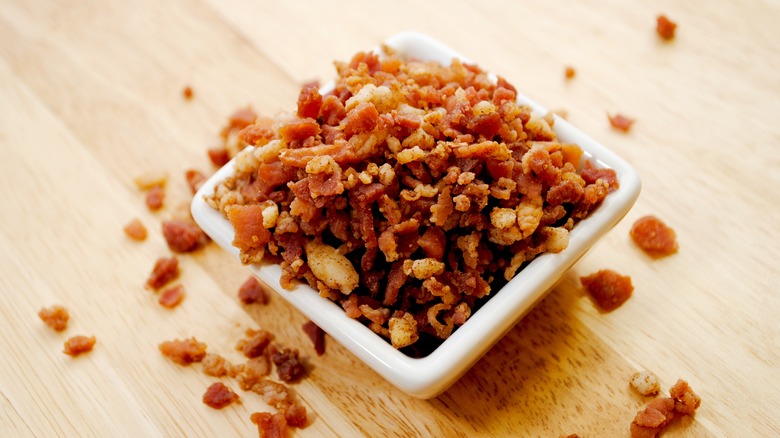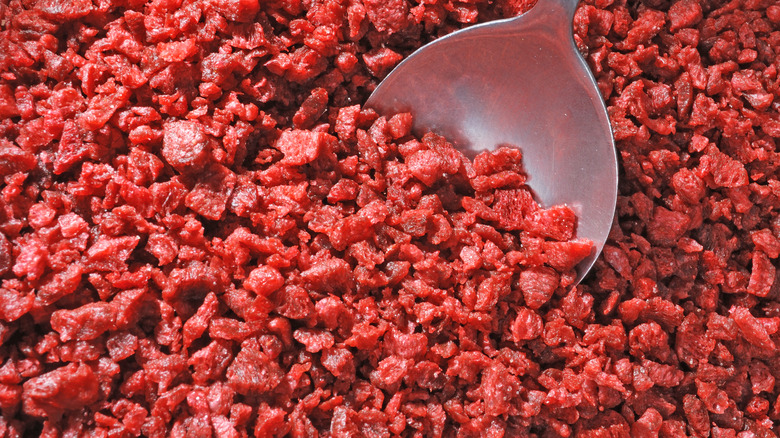How Artificial Are Store-Bought Bacon Bits?
Whether you're sprinkling them on a salad, topping a baked potato, or adding a secret ingredient to your deviled eggs, bacon bits are a quick, reliable way to add a pop of flavor and texture to your home-cooked meals. Of course, we think the best bacon bits will also be homemade and straight out of the frying pan. But for convenience's sake, there's no shame in buying pre-packaged bacon bits from your local grocery store. You might be surprised to learn, however, that some brands of bacon bits don't actually contain any bacon at all!
If you've been buying McCormick Imitation Bacon Bits to give your food a meaty flavor, then you haven't actually been consuming any meat. This popular brand uses soy flour to mimic the flavor and texture of crumbled bacon, minus the pork — great news for vegans, vegetarians, or anyone looking to cut down on red meat. Additionally, colorants like Red 40 dye and flavor enhancers such as disodium inosinate and guanylate help simulate the look and taste of bacon. Vegan imitation bacon bits are also a shelf-stable alternative to meat products, which need to be refrigerated after opening and used fairly quickly.
If the idea makes you uneasy, you can always opt to buy brands which use real bacon, like Oscar Mayer or Hormel. Most brands are careful to label their packaging to clearly advertise whether they're selling real or imitation bacon bits.
Are artificial bacon bits better for you?
At first glance, imitation and real bacon bits have very similar nutritional information. According to McCormick's website, a standard 7-gram serving of their imitation bacon bits contains 30 calories, 3 grams of protein, 160 milligrams of sodium, 2 grams of carbohydrates, and no cholesterol. For comparison, Oscar Mayer reports that their real bacon bits also contain 30 calories, 3 grams of protein, and 160 milligrams of sodium, though their cholesterol amount is higher (5 milligrams) and they contain no carbohydrates.
Both imitation and real bacon bits have health drawbacks. In addition to its high fat, sodium, and cholesterol content, bacon — even the supposedly "uncured" variety — is considered a group one carcinogen, as it contains nitrites which are known to cause cancer when mixed with proteins. Far from being a pure whole food, even Oscar Mayer's real bacon bits contain chemical additives like hickory smoke flavoring and sodium nitrite.
Unsurprisingly, McCormick's and similar imitation bacon bit products contain artificial ingredients, from Red 40 and caramel coloring to hard-to-pronounce flavor enhancers like disodium inosinate and guanylate, which are used with MSG to create an umami flavor. Though there is some concern about the safety of additives like Red 40, and artificial ingredients in general, there is not sufficient evidence to prove that these ingredients alone are harmful to your health — but they're certainly not nutritionally dense. Ultimately, which product you consider healthier comes down to your own dietary preferences and comfort with artificial ingredients.
Why you should consider making your own bacon bits
Neither store-bought variety sound appealing? Bacon bits are perfectly easy to make at home. Cooking your bacon in the oven is the easiest way to ensure it crisps up nice and evenly without making a greasy mess. From there, simply chop or crumble your bacon into tiny pieces.
If your goal is to avoid chemical additives that might be harmful to your health, however, you'll have to be highly picky about sourcing your bacon. Virtually all mass-produced bacon you can buy at the grocery store, even that which claims to be "uncured," is treated with nitrites — including those that come from vegetables. There are smaller, artisanal butcher operations that dry cure bacon without nitrites by using salt or a nitrite alternative, and you could go as far as curing your own meat if artificiality is your chief health concern.
Otherwise, the benefit of making your own bacon bits is more about taste and freshness than healthiness. Whether imitation bacon bits actually taste like bacon is up for debate, and the store-bought real bacon kind tend to get limp and soggy. If you're a meat-eating bacon lover, your best bet is to cook bacon bits from scratch. But if you're looking to accomplish meaty flavor and crispy texture without eating real meat, imitation bacon bits are a cool, inexpensive option to keep around the house.


